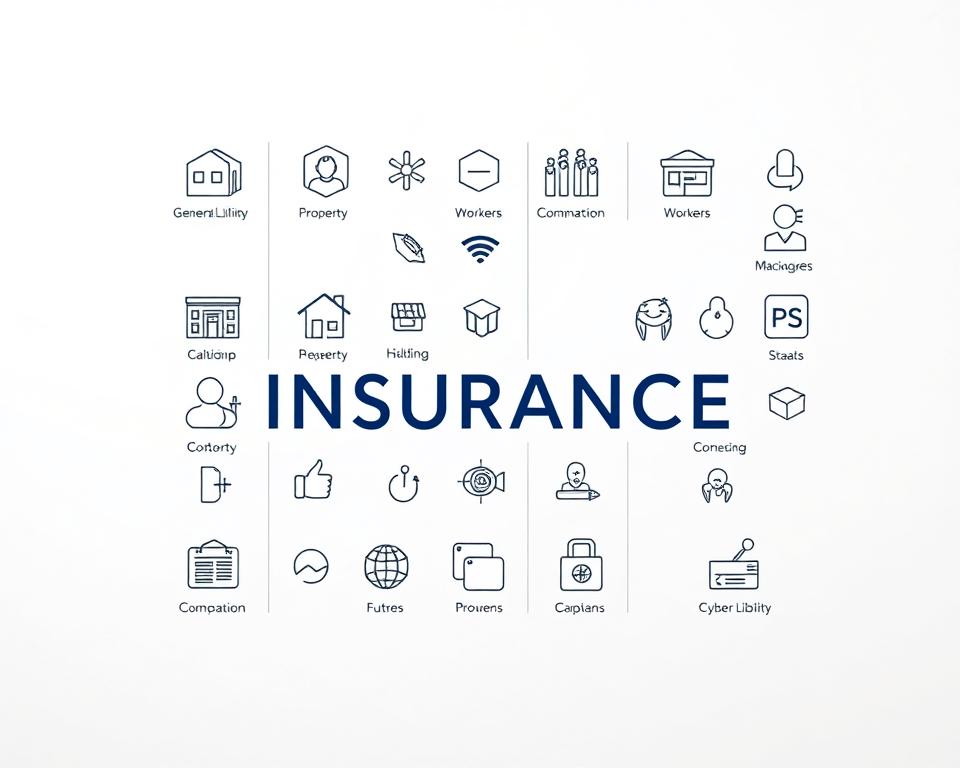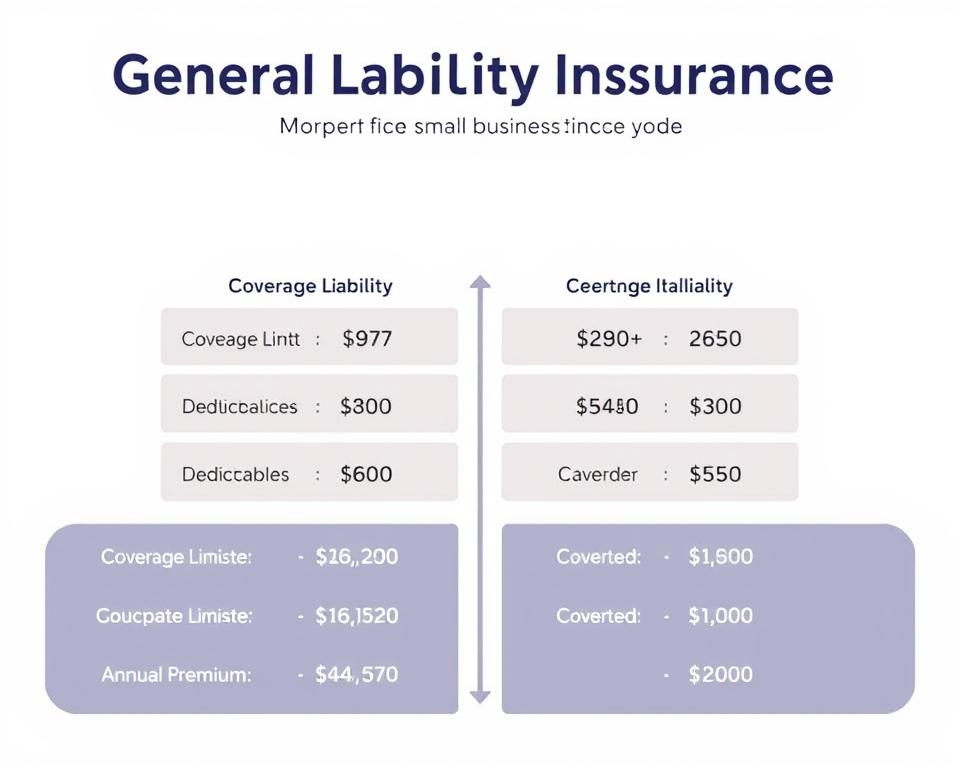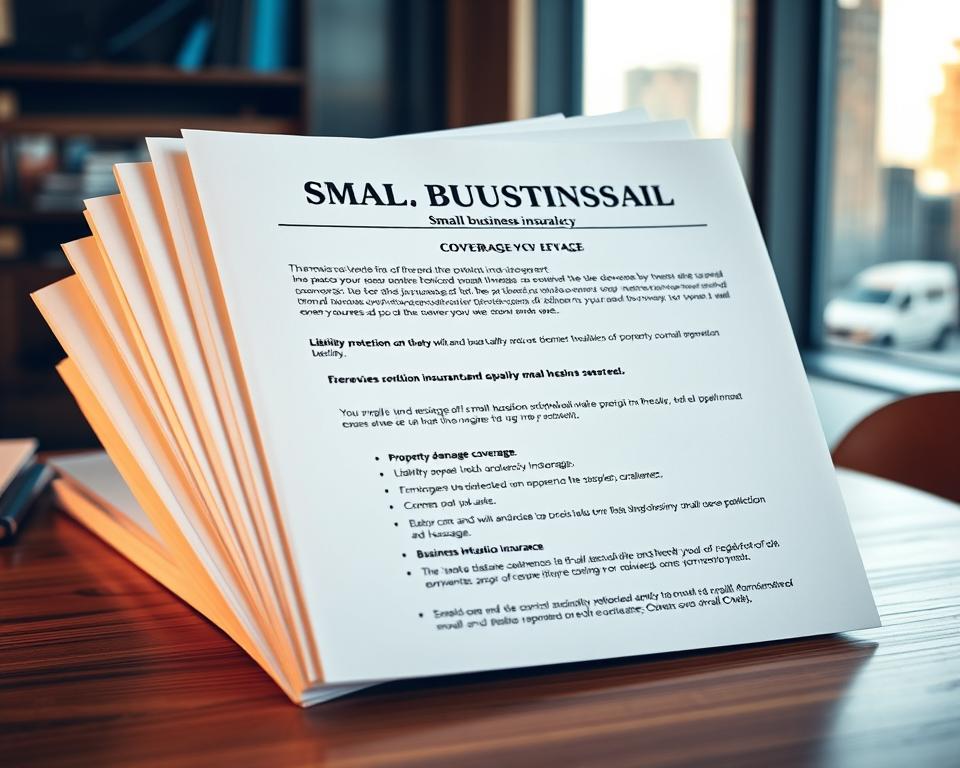One in four small businesses with 1-50 employees don’t have general liability insurance. This leaves them open to big financial risks. It’s very important to pick the right small business insurance.
Top companies like Allianz, The Hartford, and Cincinnati Insurance offer great rates through Simply Business. They are backed by 2024 complaint data from the National Association of Insurance Commissioners. Chubb and Next Insurance also stand out with low costs and special coverages like business interruption or liquor liability policies.
This guide helps you find the best insurance for your business. It shows how to choose between Business Owner’s Policies (BOPs) and special industry protections. You’ll learn how to protect your business without spending too much.
Key Takeaways
- 29%–35% of small businesses lack essential liability coverage.
- Leading insurers include Allianz, The Hartford, and Chubb with low rates and specialized policies.
- 2024 ratings factor in complaint data from state insurance departments.
- NerdWallet’s top picks offer features like online claims filing and retirement services.
- Business Owner’s Policies (BOPs) bundle coverage to simplify protection.
Whether you have a retail store or a service business, this article helps you choose the best small business insurance. It explains how to pick insurance based on your business’s risks and budget. You’ll see how complaint-based ratings and customer reviews influence the market. Plus, learn which providers offer great value without sacrificing coverage quality.
Understanding Small Business Insurance Fundamentals
Small business insurance is key to keeping startups and established companies stable. Without it, unexpected events like lawsuits or disasters can be very costly. Legal fees, property damage, and liability claims cost businesses millions each year. Yet, 29-35% of small businesses don’t have basic small business liability insurance.
This section covers the basics every owner needs to know.
“You should insure against things you wouldn’t be able to pay for on your own.” – U.S. Small Business Administration
Why Insurance Protection Matters for Small Businesses
Legal risks are a fact of life. Small business insurance policies cover everything from slip-and-fall incidents to cyberattacks. For example, a restaurant needs small business insurance coverage for foodborne illness claims, while a tech firm needs data breach protection.
Without coverage, a single lawsuit could shut down a business. The average liability claim costs $30,000–$50,000, which can quickly drain savings.

Legal Requirements vs. Recommended Coverage
- Mandatory coverages: Workers’ compensation, unemployment, and disability insurance are federally required in most states.
- Recommended additions: General liability, business interruption, and cyber insurance protect against non-mandatory but high-risk scenarios.
While laws set minimums, 80% of businesses worry about gaps in their small business insurance coverage. A small business insurance policy must balance legal compliance with real-world risks unique to your industry.
Risk Assessment for Your Business Type
Risk profiles vary widely. A construction company needs higher small business liability insurance for job-site accidents, while a boutique might prioritize inventory theft coverage. The Businessowners Policy (BOP) bundles property and liability at lower costs for many small businesses.
Factors like location, employee count, and equipment type affect both small business insurance cost and coverage scope.
Start by listing possible threats: property damage, cyberattacks, customer lawsuits, or supply chain disruptions. Then compare small business insurance policy options that address these risks without overspending. Consulting an agent ensures your small business insurance matches your operational realities.
Types of Small Business Insurance Coverage
Choosing the right small business insurance coverage is key. It depends on the risks your company faces. Policies range from physical damage to cyber threats. Let’s look at the main options every entrepreneur should know.

- General Liability Insurance: Covers damage to property, injuries, and advertising issues. For example, it pays for medical bills if a customer gets hurt in your store.
- Workers’ Compensation: Most states require it. It covers injuries or illnesses to employees. For instance, it pays for medical care if a worker hurts their back lifting boxes.
- Commercial Property: Protects your business assets like equipment and inventory. It can replace machinery damaged in a storm.
- Professional Liability (E&O): Protects against lawsuits from clients over mistakes or negligence. It covers legal costs if a client sues over bad advice.
| Policy | Coverage Focus | Example Scenario |
|---|---|---|
| Business Interruption | Lost income during closures | Reimburses a bakery’s lost revenue after a pipe burst |
| Cyber Liability | Data breaches and ransomware | Pays for IT recovery after a malware attack |
| Business Auto | Vehicle-related incidents | Covers repairs after a delivery truck collision |
“Most small businesses underestimate how niche coverage like cyber liability can prevent catastrophic losses,” says the National Association of Insurance Commissioners.
Many businesses get a small business insurance bundle like a Business Owners Policy (BOP). It combines liability and property coverage. Think about your business’s risks, like location and industry, to pick the right coverage. Talking to an agent helps make sure you’re fully protected.
General Liability Insurance: The Foundation of Business Protection
General liability insurance is key for small businesses to avoid unexpected lawsuits. It protects against claims like customer injuries, property damage, or bad reputation accusations. This is very important for service-based industries. Accidents during client visits or on premises can lead to expensive disputes.
Monthly premiums for small business liability insurance range from $25 to $115, with averages at $42 per month, according to industry data.

- Bodily injury from slips or equipment accidents
- Property damage during client projects
- Advertising mistakes like trademark infringement
Costs vary based on industry risk. Construction is high-risk, with monthly costs of $60–$80. Office businesses average $28–$45. To lower small business insurance cost, compare small business insurance quotes from top carriers like The Hartford, Travelers, and Chubb. They offer flexible limits, with $1 million per-incident coverage starting at $25/month.
Smart ways to save include bundling policies, raising deductibles, or choosing higher deductibles. Businesses in low-risk areas might get discounts. Always check a carrier’s J.D. Power ratings and customer reviews for efficient claim handling. With careful planning, you can get affordable protection without sacrificing quality.
Professional Liability Insurance: Protecting Your Expertise
Professional liability insurance, also known as errors and omissions (E&O) coverage, is vital for service-based companies. It protects businesses from claims of negligence, wrong advice, or service failures. Unlike general liability, it covers financial losses from service disputes, not physical harm.
This insurance includes legal defense costs, client damages, and settlements, even for unfounded claims. For instance, a consultant sued over a bad report or a contractor blamed for design mistakes is covered. Most small businesses choose $1 million per occurrence and aggregate limits.
- Covers: Errors, omissions, negligence, and breach of contract
- Excludes: Property damage, intentional acts, employee injuries, and contractual obligations

Companies like Berxi and biBerk offer custom policies. Berxi saves 15% by skipping broker fees, and biBerk gives up to 20% savings directly to customers. Both require add-ons for full protection against exclusions like cyber incidents or prior agreements.
“Around 33% to 50% of small businesses face lawsuits annually, with costs often exceeding $10,000.”
Professional liability insurance can be part of a business owners policy (BOP) for more coverage. The right policy protects against damage to your reputation and financial loss. Always check policy terms to make sure they fit your industry’s risks.
Property Insurance for Small Business Assets

Keeping your business safe is key. Commercial property insurance helps protect your small business insurance policy from damage. This includes fires or storms. You can choose between replacement cost or actual cash value, which affects and what’s covered.
- Buildings: Protects owned or leased structures
- Equipment: Covers machinery, computers, and tools
- Inventory: Safeguards products in storage or transit
- Outdoor items: Includes signage, fences, and landscaping
Commercial Property Coverage Explained
Businesses have two choices for how to value their property:
| Option | Replacement Cost | Actual Cash Value |
|---|---|---|
| Coverage | Replaces items at current market value | Pays depreciated value based on item age |
| Cost | Higher premiums | Lower premiums |
Business Interruption Insurance
This insurance helps when your business can’t operate due to disasters. It’s cheaper when bundled with a Business Owner’s Policy (BOP). Costs start at $60 a month for small teams. Progressive offers it everywhere except Hawaii.
Equipment Breakdown Coverage
This coverage protects against mechanical failures in things like HVAC systems and electronics. Adding it to your policy helps with repair and downtime costs. The cost depends on the equipment’s value and maintenance history.
Get to find the best fit for your business. Custom policies ensure your assets and operations stay safe.
Workers’ Compensation Requirements Across States
Workers’ compensation is key for small business insurance. It protects employees hurt at work. Every state except Texas requires it for businesses with one employee. Knowing the rules in each area is vital for small business liability insurance rules.

- Businesses with employees in multiple states must follow each state’s rules.
- Remote workers need coverage in states where they work.
- Subcontractors must have their own insurance to avoid being held liable.
- Rules for part-time or temporary workers differ by state.
| State Group | Details |
|---|---|
| NCCI States (35) | Use standardized rating system |
| Modified NCCI (10) | Adjusted rating systems |
| Independent Systems (5) | Unique rating methodologies |
| State-Fund Required (4) | Wyoming, ND, WA, OH require state-run programs |
California, New Jersey, and Pennsylvania have special class codes that affect prices. Not following the rules can lead to fines, legal trouble, and losing your business license. Sole proprietors without employees usually don’t need it. Check official sources for your state’s rules to avoid expensive mistakes in your small business insurance.
Small Business Health Insurance Options

Small business health insurance is key for keeping good employees. UnitedHealthcare has plans that fit different budgets and needs. For instance, Rubber & Accessories saved money by picking a plan for 40 employees through UnitedHealthcare’s Small Group program.
“Finding affordable small business insurance doesn’t mean compromising quality. Our team now has access to nationwide networks and preventive care benefits.” — Rubber & Accessories HR Manager
- Group Plans: Pick from HMO, PPO, EPO, POS, or HDHP. UnitedHealthcare’s PPOs give flexibility with discounts for in-network care.
- SHOP Marketplace: Businesses with 2–50 employees can shop on the Small Business Health Options Program (SHOP) in some states. Visit the Small Business Store where available—except AK, HI, NV, and VT.
- Tax Benefits: Companies with under 25 employees earning ≤$56k annually might get tax credits for up to 50% of premiums. Use Section 125 plans to deduct premiums before taxes.
Get small business insurance quotes online by filling out a quick form on UnitedHealthcare’s site. Enrollment deadlines are flexible: sign up anytime, with coverage starting the next month if submitted by the 15th. Look into these options to offer competitive benefits while keeping costs down.
Business Owner’s Policy (BOP): Bundled Protection
A small business insurance policy that makes things easier, the Business Owner’s Policy (BOP) puts together liability, property, and income protection. It’s a single package that often saves 10-15% compared to buying each policy separately. This makes it a great option for those looking to save money.

- Coverage Basics: Includes property damage, liability claims, and income recovery after disasters
- Cost Advantage: Average monthly cost ranges from $40–$115, aligning with affordable small business insurance needs
- Optional Add-Ons: Data breach, equipment breakdown, and forgery coverage available through endorsements
Business interruption coverage helps recover income losses. Property protection covers fire, vandalism, and wind damage. But, BOPs don’t cover professional liability, workers’ compensation, or natural disasters like earthquakes. Businesses need to buy separate policies for these risks.
To qualify, a business must have under 100 employees and make less than $5 million a year. Progressive offers BOPs in most states, except Hawaii. It’s wise to compare quotes from different providers to find the best fit for your business. For specific risks, consider adding extra coverage or standalone policies to your BOP.
How to Get Affordable Small Business Insurance Quotes
Getting small business insurance quotes doesn’t have to be hard. Start by looking at platforms like CoverWallet, Simply Business, and Thimble. They help you find the best small business insurance easily. These tools give you instant quotes that fit your needs.

“The Thimble app lets me get quotes and purchase coverage in minutes. The monthly rate is much lower than other providers’ annual prices divided by 12.” — Customer Review
Compare Online Platforms
Online quote tools ask for basic details like your industry and revenue. For example, general liability insurance starts at $17/month through some providers. Use these platforms to:
- Identify gaps in current coverage
- Compare small business insurance cost across carriers
- Filter options by affordable small business insurance requirements
Work with Agents
Independent agents can help you avoid overpaying. They can bundle policies like general liability with workers’ compensation for discounts. Ask agents about:
- Industry-specific endorsements
- Discounts for safety programs
- Claims history adjustments
Negotiate Strategically
Lower premiums by:
- Bundling policies (e.g., property + liability)
- Selecting higher deductibles if cash reserves allow
- Requesting multi-year commitments for stability
| Factor | Impact | Example |
|---|---|---|
| Industry Risk | Highest premium impact | Construction vs. consulting |
| Business Size | Moderate effect | 5 employees vs. 50 |
| Location | Varies by region | High-crime areas raise rates |
Using online tools and agent insights ensures you get coverage that’s both affordable and effective. This way, you don’t have to sacrifice quality for cost.
Factors Affecting Small Business Insurance Cost
Small business insurance costs can vary a lot. Knowing what affects these costs helps owners plan better. Let’s look at the main things that shape your premiums.
Industry Risk Classifications
- High-risk industries like construction, manufacturing, or healthcare face higher small business insurance cost due to frequent claims.
- Low-risk fields, such as consulting or IT, often pay less because of fewer incidents.
- Classifications using NAICS or SIC codes determine base rates, with underwriters adjusting premiums based on industry-specific risks.
Business Size and Revenue
- Businesses with more employees or higher revenue may see increased small business insurance cost. For example, a firm with 20+ staff pays more for workers’ compensation than a solo operation.
- Annual revenue impacts liability coverage costs, as larger operations have greater exposure to claims.
- Average small business insurance quotes for a Business Owner’s Policy (BOP) start at $85/month, but costs rise with payroll size and property values.
Location and Claims History
- Businesses in disaster-prone areas like hurricane zones or urban regions with high crime pay more for property and liability coverage.
- Prior claims history impacts premiums: frequent claims may raise rates by 10–50%, while claim-free histories can earn discounts.
- Businesses renting vs. owning property also affect small business insurance coverage costs—owned properties often require higher premiums.
Comparing small business insurance quotes from multiple providers helps find the best rates. Regularly reviewing policies as your business grows ensures coverage aligns with evolving needs.
Specialized Insurance for Specific Industries
Small business insurance isn’t a one-size-fits-all solution. Industries like construction, healthcare, and tech have unique risks. For example, restaurants need liquor liability for alcohol-related incidents. Construction firms protect equipment with inland marine coverage.
“Chubb’s 30 specialized industry practices help businesses address risks others overlook.”
Here’s how different sectors can protect themselves:
- Restaurants: Liquor liability and food contamination coverage
- Construction: Builder’s risk insurance and contractors equipment coverage
- Technology: Cyber liability and intellectual property protection
- Healthcare: Medical malpractice tailored to practice areas
| Industry | Key Coverage |
|---|---|
| Construction | Builder’s risk, surety bonds |
| Healthcare | Medical malpractice, HIPAA compliance |
| Retail | Inventory theft, data breach protection |
| Technology | Cyber liability, errors & omissions |
Chubb has over 500 risk engineers to assess unique exposures. Their Risk Engineering Center focuses on fire safety and equipment breakdown prevention. Cyber liability insurance from Chubb helps businesses recover from data breaches, covering costs like legal fees and customer notifications.
Product liability insurance defends manufacturers against defective product claims. D&O insurance shields leaders from mismanagement lawsuits. Small business insurance coverage must evolve with industry-specific threats—from floods in agriculture to motorcycle fleets in transportation. Work with insurers who understand your niche to avoid gaps in protection.
Conclusion: Securing the Right Small Business Insurance Protection
Small businesses face many risks that could harm their survival. Yet, 29-35% of companies with 1-50 employees don’t have basic insurance like general liability. Without the right insurance, a fire, lawsuit, or cyberattack could be disastrous. Getting the right coverage is more than just following the law—it’s a smart investment in your business’s future.
Choosing the best insurance starts with knowing your business’s specific risks. General liability (about $42/month) and workers’ compensation ($47/month) are key. For tech companies, cyber insurance ($132/month) is essential. Bundled policies like BOPs are cost-effective and cover many bases.
Having the right insurance also makes your business more attractive to clients and employees. It shows you care about their well-being. Regularly reviewing your policy with an agent helps it grow with your business. Don’t overlook insurance, as it can leave your business vulnerable. By picking the right insurance and updating it yearly, you protect your business from unexpected problems. Insurance is not just a cost—it’s a key to your business’s success.


